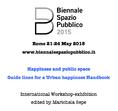sociology giornata di studi inu immigration ecological networks identity citizenship culture digitalization tools and techniques housing mobility social practices rural areas representation social housing sprawl urban practices social exclusion/integration central places transport & logistics superplaces events local plans ricerca cartography
21 May 2015 – 24 May 2015
HAPPINESS AND PUBLIC SPACE Guide lines for a Urban happiness Handbook CALL FOR PAPERS
Rome, Italy
SUBMISSION OF PAPERS | EXTENDED DEADLINE (NEW!): 02.05.2015
International Workshop-exhibition edited by Marichela Sepe
Biennale dello Spazio Pubblico
HAPPINESS AND PUBLIC SPACE
Guide lines for a Urban happiness Handbook
International Workshop-exhibition edited by Marichela Sepe
The English agenda has given considerable attention to the quality of urban design whose assumption is that it comes directly by the place experience of the people. The senses are part of everyday life of the people and the sensory experience which it is lived in a place let it to remember or less in a pleasant and distinctive way.
Through the analysis of places, a more detailed and qualitative interpretation of the city is carried out. This is not circumscribed to its aesthetic essence, nor even to its physical geometry. The functional and symbolic interpretations of the elements of a place are the fundamental factors for understanding its meaning. And "as society changes, so does signification. Meanings attached to the built environment become modified as social values evolve in response to changing patterns of socio-economic organisation and lifestyles" (Knox, 1984) .
As Relph (1976) asserts, "Perceptive space is a space of action centred on immediate needs and practices, and as such it has a clearly developed structure. (...) This structure can clearly be in no way understood as objective or measurable - rather distances and directions are experienced as qualities of near or far, this way or that, and even when these are made explicit as paths or trails they are known with their special meaning. (...) Perceptive space is also the realm of direct emotional encounters with the spaces of the earth, sea, and sky or with built and created spaces".
Urban studies agree on the fact that, increasingly, the goal of the project interventions in the urban space is to alter the experience of that space for its residents. Urban environments are increasingly designed to be distinctive, trying to create memorable sensory experiences and give happiness for the people who use them. Even people who visit ordinary urban centres can describe a series of emotional experiences concerning those places given by the five senses. And to place these experiences can be very different from one place to another. This workshop aims to present both theoretical aspects and case studies concerning urban happiness in public space.
SOME OF THE TOPICS SHOULD INCLUDE THE FOLLOWING:
• What are the factors which influence happiness from the urban and/or socio-economic point of views ?
• Can an urban or landscape project or a public space influence the perception of happiness or these are only influenced by other factors or conditions (climate, mood, etc ...)?
• What are the best practices where happiness can be recognized? -What are the happier cities?
• How urban happiness can be managed?
• Is Urban Happiness durable or should be continuously adapted? - Is Happiness an adaptive urban phenomenon?
All the accepted papers will be published on Urbanistica Dossier online journal with ISBN.
All the accepted projects proposed for the "Urban Happiness and public space" exhibition will be exhibited.
A selection of accepted papers and projects will be presented in the framework of the third Biennal of Public Space with the aim of identifying the BEST PRACTICES related to these topics and guide lines for an Urban happiness Handbook. 
Participation to the III Biennal of Public Space is free.
IMPORTANT DATES
• 15 April 2015 submission of: papers formatted as the attached example (20000 characters with 1 image or 90000 with 2 images) panels in pdf (100X120 vertical) to be printed by the author at: marichela.sepe@gmail.com
• 22 April 2015: comunication of acceptance of papers and/or panels and presentation at the Biennal
Participation to the III Biennal of Public Space is free.
INFO & CONTACT
Marichela Sepe
Email: marichela.sepe@gmail.com
Event schedule:
- Start: 05-21-2015
- End: 05-24-2015.
Online resources and links




Planum
The Journal of Urbanism
ISSN 1723-0993
owned by
Istituto Nazionale di Urbanistica
published by
Planum Association
ISSN 1723-0993 | Registered at Court of Rome 4/12/2001, num. 514/2001
Web site realized by ChannelWeb & Planum Association | Powered by BEdita 3

